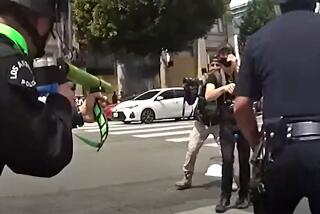Judge awards $3 million in drug agents’ killing of teenager
A “freakish series of events” led to honor student Zachary Champommier’s death on a night in June 2010 — that much is clear, a federal judge said Wednesday.
But whether the plainclothes drug enforcement officers who shot the 18-year-old after he drove into a Los Angeles County sheriff’s deputy in a Studio City parking lot were justified in doing so is a more complex matter.
In a 43-page mixed verdict, U.S. District Judge Michael Fitzgerald awarded $3 million to Champommier’s parents — $2 million to his mother and $1 million to his father, Eric Feldman — but also determined that the authorities were not negligent in their actions.
Fitzgerald summarized his ruling before a full but hushed courtroom on the 16th floor of the federal courthouse in downtown Los Angeles.
“I think I was kind of in shock,” Champommier’s grandmother, Helen Hanson, said after the hearing.
“It was a Pyrrhic victory,” added her son, Paul Champommier. “A bittersweet victory. There was no sense of joy overall.”
The shooting of Zachary Champommier, a recent graduate of Granada Hills Charter High School, sparked outrage among the teenager’s family and friends who described him as a “band geek” and not someone who would intentionally confront authorities. Champommier’s parents had alleged in a wrongful death and battery lawsuit that the agent and deputy recklessly shot at their son, who they said posed no reasonable threat.
In the heat of the moment, Fitzgerald said, federal Drug Enforcement Agent Peter LoPresti and Los Angeles County Sheriff’s Deputy Mark Brewster could have reasonably believed Brewster was in grave danger. But the judge determined that the two should not have fired their weapons at Champommier’s car because shooting at a moving vehicle would not have helped their predicament.
Champommier had come to the parking lot to meet a friend. After he arrived and parked nearby, he saw the friend, Douglas Ryan Oeters, 29, being detained by the officers, who were dressed in street clothes.
Champommier drove his mother’s car forward, hitting Brewster. How quickly he accelerated was in dispute, as was whether Brewster was still on the hood of the car when he first fired at Champommier.
The officers — who included members of the Drug Enforcement Agency, Los Angeles County Sheriff’s Department and the Los Angeles Police Department — were in the lot discussing a search warrant they had just served. They suspected Oeters was trying to break into vehicles.
Champommier “had no way of knowing that these were law enforcement officers rather than criminal thugs,” and he drove his car to “escape the danger,” according to the lawsuit.
But the U.S. government as well as Sheriff’s Department officials said Champommier tried to run down a deputy. The shooting, they contended, was reasonable.
“The nature of [Champommier’s] aggressive actions, actually hitting the deputy — that is not someone who is without some degree of fault,” Los Angeles County Sheriff Lee Baca said shortly after the shooting.
Thom Mrozek, a spokesman for the U.S. attorney’s office in Los Angeles, said the ruling was under review.
“We will evaluate our options, which certainly may include filing an appeal,” he said. One “specific factual finding” that may need further review was Fitzgerald’s determination that Brewster was not on the hood of the car when the shooting took place.
Mrozek added: “We maintain our basic position that Mr. Champommier hit a Los Angeles sheriff’s deputy with his vehicle and the DEA agent reasonably used deadly force to deal with the situation.”
Carol Champommier said outside court that although she was relieved and pleased with the verdict, the ordeal has shaken her faith in those tasked with keeping the public safe.
“I don’t look at law enforcement the same way,” she said.
She called for a review of the policies that allowed the interagency task force to debrief in a public parking lot, wearing street clothes and driving unmarked vehicles still packed with drugs and cash they had seized.
Above all, she said nothing — no damage payments or victories in court — will be enough to overcome the loss of her only child.
She told reporters that she carries an urn with her son’s ashes nearly everywhere she goes. His room, three years after his death, remains untouched.
More to Read
Sign up for Essential California
The most important California stories and recommendations in your inbox every morning.
You may occasionally receive promotional content from the Los Angeles Times.










